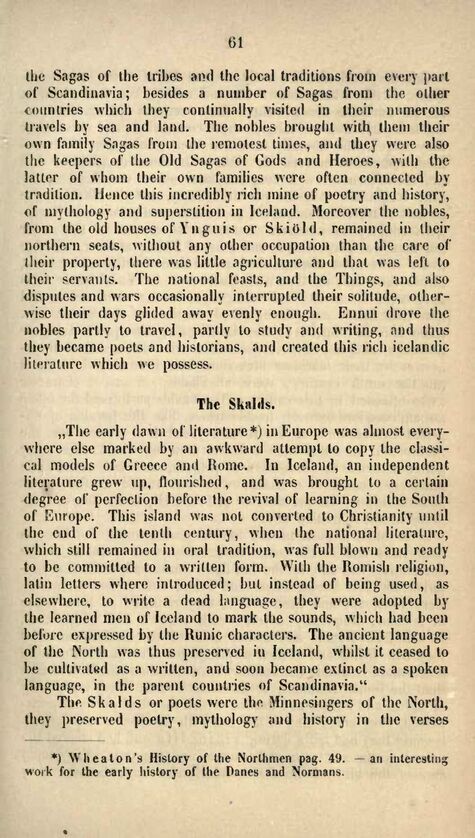
Full resolution (JPEG) - On this page / på denna sida - The Old Norsk Poetry and the Sagas

<< prev. page << föreg. sida << >> nästa sida >> next page >>
Below is the raw OCR text
from the above scanned image.
Do you see an error? Proofread the page now!
Här nedan syns maskintolkade texten från faksimilbilden ovan.
Ser du något fel? Korrekturläs sidan nu!
This page has been proofread at least once.
(diff)
(history)
Denna sida har korrekturlästs minst en gång.
(skillnad)
(historik)
the Sagas of the tribes and the local traditions from every part
of Scandinavia; besides a number of Sagas from the other
countries which they continually visited in their numerous
travels by sea and land. The nobles brought with them their
own family Sagas from the remotest times, and they were also
the keepers of the Old Sagas of Gods and Heroes, with the
latter of whom their own families were often connected by
tradition. Hence this incredibly rich mine of poetry and history,
of mythology and superstition in Iceland. Moreover the nobles,
from the old houses of Ynguis or Skiöld, remained in their
northern seats, without any other occupation than the care of
their property, there was little agriculture and that was left to
their servants. The national feasts, and the Things, and also
disputes and wars occasionally interrupted their solitude,
otherwise their days glided away evenly enough. Ennui drove the
nobles partly to travel, partly to study and writing, and thus
they became poets and historians, and created this rich icelandic
literature which we possess.
The Skalds.
„The early dawn of literature[1] in Europe was almost
everywhere else marked by an awkward attempt to copy the
classical models of Greece and Rome. In Iceland, an independent
literature grew up, flourished, and was brought to a certain
degree of perfection before the revival of learning in the South
of Europe. This island was not converted to Christianity until
the end of the tenth century, when the national literature,
which still remained in oral tradition, was full blown and ready
to be committed to a written form. With the Romish religion,
latin letters where introduced; but instead of being used, as
elsewhere, to write a dead language, they were adopted by
the learned men of Iceland to mark the sounds, which had been
before expressed by the Runic characters. The ancient language
of the North was thus preserved in Iceland, whilst it ceased to
be cultivated as a written, and soon became extinct as a spoken
language, in the parent countries of Scandinavia.“
The Skalds or poets were the Minnesingers of the North,
they preserved poetry, mythology and history in the verses
<< prev. page << föreg. sida << >> nästa sida >> next page >>